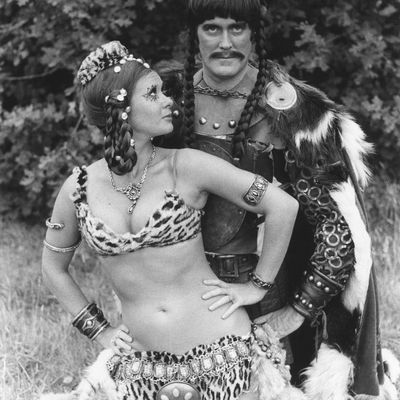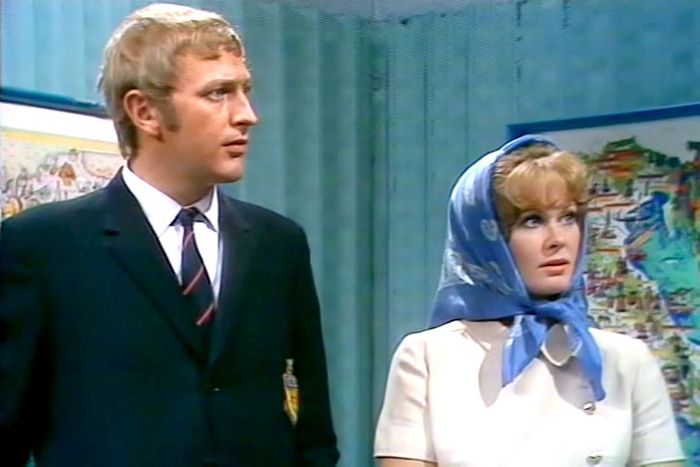
Mention the name Carol Cleveland to male comedy fans of a certain vintage and they get a faraway look in their eye, not unlike the way their TV-fan contemporaries respond to the mention of Farrah Fawcett or Pamela Anderson.
On the rare occasions when the six men who made up Monty Python did not grab the female roles for themselves, Cleveland served as their “glamour stooge” (to use her term), the intellectual absurdist troupe’s equivalent of the vaudeville comedian’s statuesque foil. She was the only person who was not a member of the core group to appear in all four seasons of Monty Python’s Flying Circus, as well as in all the movies and live shows.
Born to British parents, Cleveland moved to the United States when she was 11. Her mother encouraged her to take ballet lessons and enter beauty pageants, culminating in her serving as a Rose Parade princess on the queen’s float while still at Pasadena High. Returning to England after graduation, she became a student at the Royal Academy of Dramatic Art, Britain’s premier drama school, where her boyfriend was Ian McShane, later star of Deadwood. Her best friend was Lynda La Plante, the future creator of Prime Suspect.
After graduation, Cleveland appeared in British television series such as The Saint and The Persuaders, as well as stage roles, including Honey Bruce, stripper wife of Lenny in the West End run of Lenny, the play based on the comedian’s life.
In between acting gigs, she filled in with the kind of part-time jobs available to a leggy blonde (modeling, working as a Bunny at London’s newly opened Playboy Club). So by the time Flying Circus producer John Howard Davies called her to audition, Cleveland was a seasoned professional.
To mark the 50th anniversary of the first transmission of MPFC in 1969, we sat down with Cleveland, still willowy and glamorous in her 70s, to discuss her experiences as the de facto seventh Python.
Were there any women in comedy you admired growing up?
I was a great Lucille Ball fan. I did actually want to be Lucille Ball. Or Marilyn Monroe. I didn’t care which.
How did you come to join the Circus?
The producer [John Howard Davies] and director [Ian McNaughton] auditioned me. I’d been working with all these different comedians. Every top comedian on television, there I was. I think prior to doing Flying Circus, three of the Pythons at least had worked on shows that used other actresses who were comedy actresses, but in this case they were looking for someone who wasn’t known for that. They were looking for a pretty girl to play “the pretty girl.” I don’t think they were looking for a funny actress, but they discovered they had one.
Did you know you were signing up for the long haul?
They’d only written four episodes to begin with and were looking for a female to be in three of them. I came along for the fourth episode knowing that it was my last one, but by then they had decided they liked me. I remember the day Mike [Palin] came up and said, “Carol, we’ve got a sketch for episode seven with a wonderful part we’ve written with you in mind. The character’s name is Vanilla Whore,” and I thought, Vanilla Whore, that’s very nice. Thank you so much, but I said, “Oh. Okay.” He started to tell me about it and I said, “Michael, I’m not in episode seven. This is my last episode.” Then he went over and got John, and John went, “What’s this?” And basically they all put their big Python foot down and said, “No, we want Carol.” It turned out that Ian’s wife was an actress and he knew lots of actresses, so his idea had always been to have a different female in every episode. The agreement the Pythons came to was that if there was “proper acting” required, it would be me, and if they needed an actress to come in to do “bits,” then Ian could cast them.
Why do you think you fit in?
I was prepared to throw myself into it. I fit the bill for the pretty girl they were after originally, but they discovered I could act, I could be funny, and I was prepared to be as outrageous and silly as they wanted me to be. I mean, some of the things I did … There was one time where we had to stand on each other’s shoulders. It looks like I jumped up onto John’s shoulders, but what they did was film it backward, so I actually had to get up onto John’s shoulders, stand there, and then do a backflip onto the ground, over and over again. Luckily I was very fit. I was game for anything.
Was their way of working different from what you were used to?
With the other comedians I had worked with, they probably wrote some of their own material, but they all had writers. It was all very organized — the script had been written. But the Pythons wrote most of their own material. Because they were doing it themselves; it was very much a work in progress when we were at rehearsals.
In your book, you recall Michael Palin saying he thought the Pythons “were just not very good at writing parts for women” and you observe that they felt badly about this. Did that change over time?
When they discovered that I had a flair for comedy, the roles got more interesting. One of my favorite ones … We were at a read-through for episode whatever when they suddenly realized that they were short of a male actor for a sketch that took place in the jungle. So I think John or Eric said, “Let’s call Tom,” or whoever, and lovely Michael — he was always the one; I think if it hadn’t been for Michael, I probably always would have just been the glamour stooge — said, “What about Carol? We’ll dress her up as a man; she could do it.” So I’m dressed just like they are in the khaki shorts and the pith helmet, and they put a mustache on me. But I still have all my usual makeup — the false lashes and the lipstick — so it’s very clear this is a female playing a man. And it was very funny.
Another time they were looking for a sparring partner for Graham, who was playing a boxer. So I was his sparring partner; I’m actually in the ring. But unfortunately, I think the fans who write to me, they don’t really remember those sketches. They always think of the first sketch I ever did, which is when I was Deirdre in the marriage-guidance sketch. I didn’t say a word. I just flirted with Eric and giggled.
Were you ever tempted to contribute to the material, to make the female roles more interesting?
By the time it came to doing the second series, if I had suggested something, they certainly would have listened. But I never felt brave enough to be quite honest. I would do it now, since I’ve written two solo shows, but at the time I hadn’t done anything like that. I was in awe of them [and] the fact that they were all these very, very clever university chaps and I was a little California high-school girl.
Were you ever aware of intergroup tension?
Sometimes in rehearsals, you could see there was some tension. The first series, there was no sign of any tension. It was a learning curve they were all enjoying. It was near the end of the second series when John was obviously getting a bit bored, because he has a very low boredom threshold, John. I wasn’t part of the writing process, so I wasn’t there when they had their meetings and would go away on their trips or whatever. I could just tell occasionally … Well, John, as I say in my book, was a bit of a tease. I think he did quite enjoy goading Terry Jones, who was very excitable. And John was very calm. I did hear about this one time — I wasn’t there — when John got Terry so worked up that Terry threw a chair across the room at him.
Do you feel your Python work defined your career?
It’s nice to be well-known for something and have some celebrity status, but I do wish people remembered the other things I did. In a way, Python has been a bit of a ball and chain. Not that I didn’t enjoy doing it — it was wonderful — but it overshadowed everything else because the casting directors who used to cast me in drama series stopped seeing me as a serious actress. If I’d continued doing straight roles and comedy, I’d probably still be working and playing the character roles I should be doing now.


